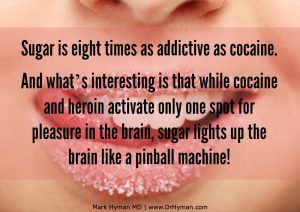 If you’ve ever worried about fat consumption, your focus may be on the wrong health enemy. Of course, transfats, once touted as healthy, have been found to be a leading cause of health issues, but other types of fat that have been villified are receiving a bum rap. It may be your sugar consumption that’s really the enemy of good health. Back in the 1950s, a professor of nutrition, John Yudkin, took a firm stand that it was sugar, not fat that caused chronic problems, which included heart disease. It was buried by a study from Harvard scientists that pointed to fat. Many years later, information showed that the study was paid for and deliberately engineered by the sugar industry to show those results—making fat the bad guy and letting sugar off the hook. Now that the truth is out, it’s time to take a look at your sugar consumption.
If you’ve ever worried about fat consumption, your focus may be on the wrong health enemy. Of course, transfats, once touted as healthy, have been found to be a leading cause of health issues, but other types of fat that have been villified are receiving a bum rap. It may be your sugar consumption that’s really the enemy of good health. Back in the 1950s, a professor of nutrition, John Yudkin, took a firm stand that it was sugar, not fat that caused chronic problems, which included heart disease. It was buried by a study from Harvard scientists that pointed to fat. Many years later, information showed that the study was paid for and deliberately engineered by the sugar industry to show those results—making fat the bad guy and letting sugar off the hook. Now that the truth is out, it’s time to take a look at your sugar consumption.
You’re eating too much sugar if you have insatiable hunger.
High fructose corn syrup—HFCS—is in everything. It’s a combination of one unit of fructose and one unit of glucose. The over consumption of fructose is the reason that HFCS increases the body’s potential for leptin resistance. Leptin is the hormone that tells the body it’s full. That leads to overeating, obesity and other metabolic problems. If you never really feel full, too much sugar might be the problem.
Do you have diabetes or insulin resistance—a precursor to diabetes?
A diet high in sugar will lead to insulin resistance. In fact, in many studies scientists do it in rats quickly with a diet that’s abnormally high. You’ll notice the effects of insulin resistance if you eat a high sugar diet. Not only will it put on weight around your middle it will lead to fatigue, insatiable hunger, high blood pressure and even brain fog. When you notice those symptoms, you’re on your way to full-blown diabetes, which is far more serious and life threatening.
Your sugar levels may be too high if you have non alcoholic fatty liver disease.
Even though your pancreas may be working hard creating insulin, there are other organs that make sugar work hard too. One is the liver. Metabolizing fructose can create inflammation and stress the liver. It causes fat to accumulate in the liver and is a key player in the creation of fatty liver disease. One of the studies on this condition showed that people with this condition drink two times more soft drinks than people without the condition. Soft drinks are a culprit that people often neglect to count as a source of sugar, even though it’s high.
- High blood pressure may be an indication you’re consuming too much sugar. While salt is often called the culprit, many studies now show sugar may be the problem—or at least part of it.
- Consider yourself addicted to sugar if you find you’re cranky when you don’t get a sugar fix. The sugar addiction shares similarities with drug addiction when you consider it has craving, bingeing and withdrawal behavior.
- The American Heart Association states that the amount of extra added sugar (not considering natural sugar) should be no more than 9-tsp for men and 6-tsp for women.
- Read all labels carefully and look for sugar, fructose or other sugar synonyms. Manufacturers even get creative like including words like maize sugar, another word for corn syrup.

